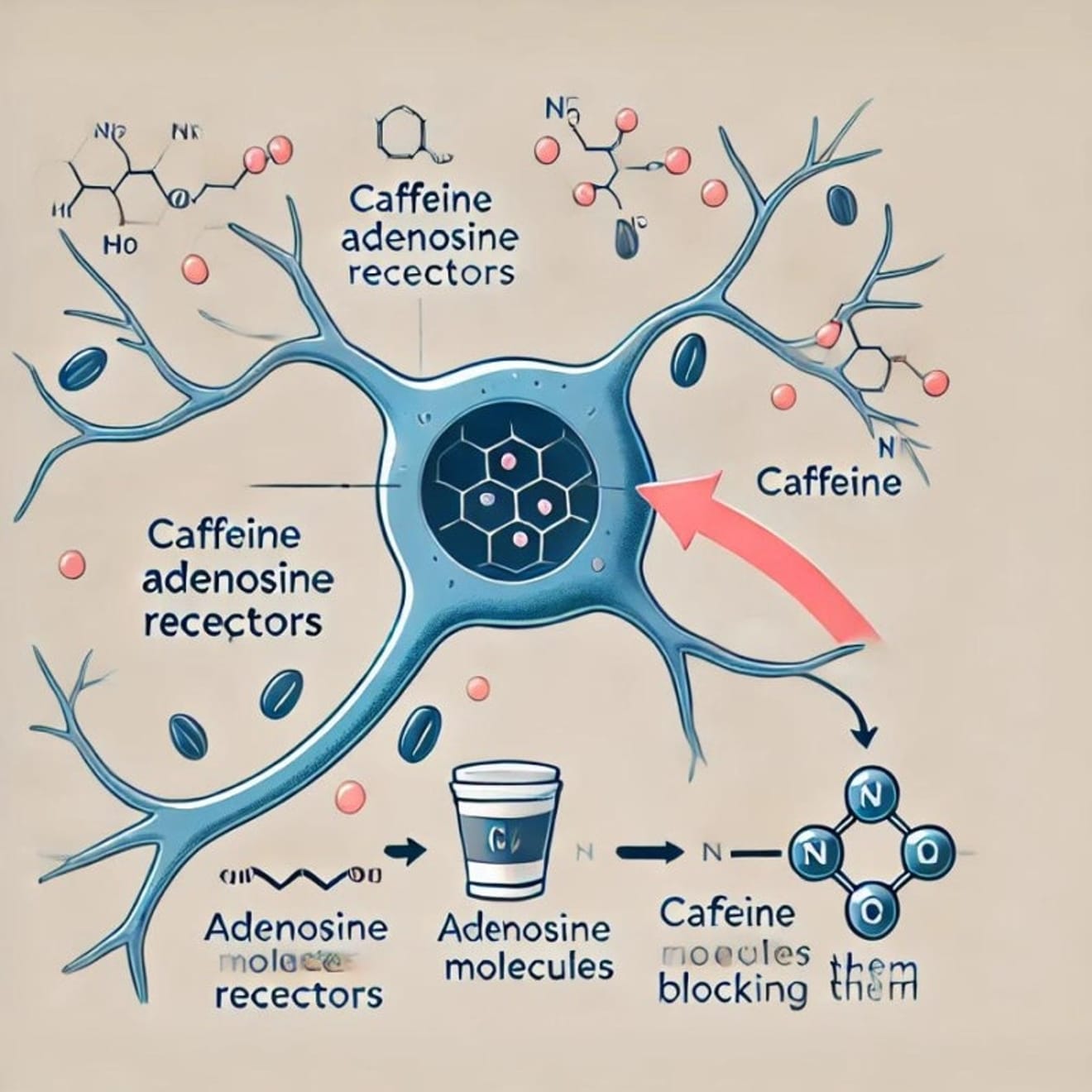Subject
- #Caffeine
- #Running
- #Intake
- #Effects
- #Exercise
Created: 2025-02-14
Created: 2025-02-14 08:25

Hello, this is #Runninghaeyoung, sharing running information. Caffeine can help reduce fatigue and increase concentration during running or exercise. However, simply increasing the amount of caffeine does not improve performance. For runners, the appropriate amount and timing of caffeine intake are important factors!
How Does Caffeine Help with Exercise?
Caffeine blocks adenosine receptors in our brain, delaying fatigue and improving concentration. *Adenosine: A neurotransmitter that inhibits nerve activity and induces drowsiness

Image created using GPT
I always drink caffeine before running long distances. Caffeine is naturally found in coffee, tea, chocolate, and cola, and is also added in synthetic form to sports gels, energy drinks, and supplements.

Consuming caffeine during exercise can provide the following effects: <b>Delayed Fatigue</b>: Makes strenuous exercise feel less strenuous <b>Improved Concentration</b>: Maintains focus during competition <b>Reduced Muscle Soreness</b>: Reduces pain and allows you to run longer <b>Improved Athletic Performance</b>: Particularly enhances performance in endurance sports However, not everyone reacts to caffeine the same way. Some people metabolize caffeine efficiently, while others experience side effects even with small amounts. Finding the right dosage for each individual is crucial.
Caffeine Intake Guide Before and After Exercise
To maximize the effects of caffeine while minimizing side effects, it's best to adjust your intake based on your body weight. <b>Recommended amount:</b> <b>2-3mg</b> per kg of body weight is the most appropriate dose <b>Caution:</b> Exceeding <b>5-6mg</b> per kg of body weight increases the risk of side effects without additional benefits For example, for a 60kg runner: Appropriate intake: <b>120-180mg</b> Upper limit: <b>300-360mg</b> (Higher intake increases the likelihood of side effects) 🚨 <b>Side effects of excessive intake</b> Headache, anxiety, nervousness, increased heart rate, increased blood pressure, indigestion, heartburn, sleep disorders

Caffeine Intake Timing <b>30-60 minutes before exercise:</b> The most effective time Starting exercise after consuming 2-3mg/kg allows blood concentration to peak, maximizing effectiveness. Caffeine can be consumed in various ways, including coffee, energy drinks, and sports gels. <b>During long-distance running (3 hours or more)</b> In long-distance running such as marathons and ultramarathons, supplementing in small amounts in the middle or later stages to reduce fatigue in the latter half. Supplementing around 12mg/kg at 30-60 minute intervals is effective. <b>Towards the end of a race (for a final sprint)</b> Consuming 12mg/kg at the end of the race helps maintain focus and sprint at the end. 1. Coffee (90-250mg) Individual differences in consumption methods are large 2. Sports gel (20-40mg) Varies by brand; convenient replenishment during exercise 3. Red Bull (80mg) When immediate energy is needed <b>Caution:</b> Mixing multiple caffeine sources increases the risk of overconsumption, so check the caffeine content of individual products!

Myths and Truths about Caffeine ❌ <b>Stopping caffeine increases effectiveness?</b> Consuming caffeine regularly does not diminish its effectiveness during exercise. In other words, you don't need to stop caffeine before a competition. ❌ <b>Caffeine causes dehydration?</b> Studies show that caffeine at less than 6mg per kg of body weight does not affect fluid balance. Moderate caffeine intake does not increase the risk of dehydration during exercise. ❌ <b>With caffeine, carbohydrates are unnecessary?</b> Caffeine cannot replace carbohydrates. Carbohydrates provide energy, while caffeine reduces fatigue and maintains focus. Always consume carbohydrates along with caffeine during exercise.
Caffeine can be a powerful tool for runners, but simply increasing intake doesn't necessarily increase effectiveness. Finding the right dose for your weight and adjusting the timing of intake is important. Also pay attention to carbohydrate replenishment and hydration. <b>Appropriate intake:</b> 2-3mg per kg of body weight <b>30-60 minutes before exercise, or small supplements in the latter half of long distances</b> <b>Find a method that suits you among various caffeine sources</b> <b>Too much caffeine can cause side effects, so be careful!
Comments0